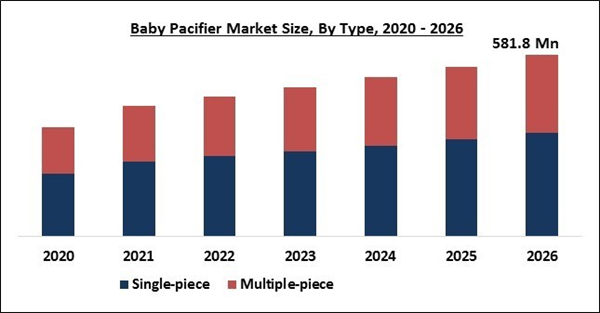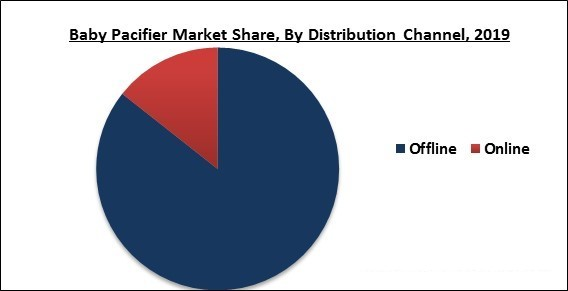The rising birth rate, affordability of pacifier and shifting lifestyle are contributing to the growth of the baby pacifier market. The pacifiers help babies to keep calm & provide them more comfort and, thereby motivating parents to buy them for their babies. Along with that, the increasing population of working women has also positively affected the market demand. However, using the pacifiers on a regular basis can cause infections in babies, which is anticipated to hinder the growth of the market over the forecast years. Some Determinants like increasing awareness about pacifiers in emerging nations & utilization of technology in pacifiers will provide new growth avenues for the market.
The rising disposable income of parents contributes to the increasing demand for baby pacifiers. With the increasing disposable income, the purchasing power of customers also increases which make them spend more on different products. Due to this rise in purchasing power, parents are creating more demand for different variety of baby products like toys, diapers, baby pacifiers, wipes, and feeding accessories. In addition, parents are getting aware of the importance of using these baby care products that is why they are spending heavily on buying these products. Thus, the increasing disposable income of parents is supporting the demand for baby pacifiers that further contributes to the growth of the market during the forecast period.
Type Outlook
Based on Type, the market is segmented into Single-piece and Multiple-piece. The one-piece baby pacifier segment procured the highest market share. The one-piece baby pacifier is broadly accessible across the world and is very economical. The one-piece baby pacifiers are crafted from a single molded piece of silicone, plastic, or latex. These single-piece pacifiers cannot tear apart easily which further reduces the risk of choking due to their design.
Size Outlook
Based on Size, the market is segmented into Small, Medium and Large. The small-size pacifiers witnessed the highest market share. Small-size pacifiers are used for infants who are below 6 months. This segment emerged as the leading segment because it is recognized as an important baby care product for the new born babies. Moreover, these small-size baby pacifiers are mostly made up of silicone that is tested by FDA. The one-piece baby pacifiers are among the primary kind of baby pacifiers which come under the category of a small-sized pacifier.
Distribution Channel Outlook
Based on Distribution Channel, the market is segmented into Offline and Online. Under this segment, the offline channel garnered the major revenue share due to the increasing sales of pacifiers through offline stores. These offline stores help in providing a wide range of baby care products among the branded and private-labelled categories. The option of checking out the product before the final purchase in these offline stores is supplementing the growth of this segment.
Regional Outlook
Based on Regions, the market is segmented into North America, Europe, Asia Pacific, and Latin America, Middle East & Africa. Among all the regions, Asia-Pacific emerged as a leading region of this market. The growing number of infants in Asia-Pacific is propelling the growth of the market. There are factors like increasing disposable income of customers along with the increasing infant population & rising urbanization, which are positively supporting the growth of the regional market.
The market research report covers the analysis of key stake holders of the market. Key companies profiled in the report include Koninklijke Philips N.V., Newell Brands, Inc., Baby Shusher, LLC, Doddle & Co. LLC, MAM Babyartikel GmbH, The Natural Baby Company, Natursutten ApS, The White Company (Bectin Corporation), Trebco Specialty Products, Inc. (WubbaNub), and Mayborn Group Limited.
Scope of the Study
Market Segments covered in the Report:
By Type
- Single-piece
- Multiple-piece
By Size
- Small
- Medium
- Large
By Distribution Channel
- Offline
- Online
By Geography
- North America
- US
- Canada
- Mexico
- Rest of North America
- Europe
- Germany
- UK
- France
- Russia
- Spain
- Italy
- Rest of Europe
- Asia Pacific
- China
- Japan
- India
- South Korea
- Singapore
- Malaysia
- Rest of Asia Pacific
- LAMEA
- Brazil
- Argentina
- UAE
- Saudi Arabia
- South Africa
- Nigeria
- Rest of LAMEA
Companies Profiled
- Koninklijke Philips N.V.
- Newell Brands, Inc.
- Baby Shusher, LLC
- Doddle & Co. LLC
- MAM Babyartikel GmbH
- The Natural Baby Company
- Natursutten ApS
- The White Company (Bectin Corporation)
- Trebco Specialty Products, Inc. (WubbaNub)
- Mayborn Group Limited
Unique Offerings from the Publisher
- Exhaustive coverage
- Highest number of market tables and figures
- Subscription based model available
- Guaranteed best price
- Assured post sales research support with 10% customization free
Table of Contents
Companies Mentioned
- Koninklijke Philips N.V.
- Newell Brands, Inc.
- Baby Shusher, LLC
- Doddle & Co. LLC
- MAM Babyartikel GmbH
- The Natural Baby Company
- Natursutten ApS
- The White Company (Bectin Corporation)
- Trebco Specialty Products, Inc. (WubbaNub)
- Mayborn Group Limited










